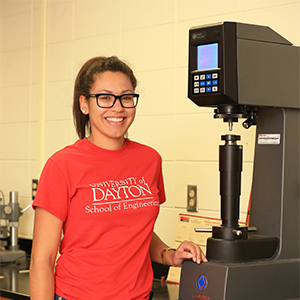Aerospace Engineering (M.S.)
Master of Science in Aerospace Engineering
Take your next step toward a new frontier of professional or scholarly success.
Our research, particularly in the areas of nanomaterials, energy systems, and fuels and combustion — as led by the von Ohain Fuels and Combustion Center — is enhanced by our relationship with the Air Force Research Laboratories.
You can choose from numerous research opportunities: aircraft fuels and combustion, alternative fuels for future use in homes, transportation, and industrial energy systems. Experiment with robotics and controls, nanomaterial characterization, kinematic design, or aerospace design.
Regardless of your area of interest, full- and part-time programs are available that enable you to work with faculty members who have gained international recognition for their research and are dedicated to your success.
Plan of Study
University Catalog for overview and courses for the aerospace engineering master's degree program.
Master of Science (M.S.) in Aerospace Engineering
A minimum of 30 semester hours:
- Thesis option: 24 semester hours of course work (8 classes) and 6 semester hours of research credit
- Non-thesis option: 30 semester hours of course work (10 classes). (Suggested for International Students.)
Admission Requirements
In addition to the online application, you should submit the following:
- Official academic records of all previously attended colleges or universities must be submitted directly from the colleges or universities to the Office of Graduate Admission Processing. Hand-carried transcripts, official copies marked Issued to Student and unofficial copies are not acceptable.
- Three letters of recommendation from professors or employers.
- A personal statement or résumé.
- Results from the GRE are not required. However, candidates are welcome to submit a score in support of their application.
Applicants must have an undergraduate degree from an accredited program in engineering, physics, chemistry, applied mathematics or other appropriate program of study. Applicants with a different undergraduate degree may be required to complete prerequisites. Applicants should have at least a 3.0 cumulative grade-point average on a 4.0 scale. Some programs require higher GPAs for admission. In some cases, applicants with a GPA below 3.0 may be admitted on a conditional basis.
Additional requirements apply for international students.
Application Deadlines
Applications accepted on a rolling basis with the following approximate general deadlines:
- Fall Term: June 15th
- Spring Term: November 15th
- Summer Term: March 15th
Please contact your department chair to follow up on exact deadlines.

